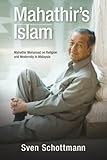Mahathir's Islam : Mahathir Mohamad on Religion and Modernity in Malaysia / Sven Schottmann.
Material type: TextPublisher: Honolulu : University of Hawaii Press, [2018]Copyright date: ©2018Description: 1 online resource (258 p.)Content type:
TextPublisher: Honolulu : University of Hawaii Press, [2018]Copyright date: ©2018Description: 1 online resource (258 p.)Content type: - 9780824846749
- 9780824876470
- 959.505/4092 23
- DS597.215.M34
- online - DeGruyter
- Issued also in print.
| Item type | Current library | Call number | URL | Status | Notes | Barcode | |
|---|---|---|---|---|---|---|---|
 eBook
eBook
|
Biblioteca "Angelicum" Pont. Univ. S.Tommaso d'Aquino Nuvola online | online - DeGruyter (Browse shelf(Opens below)) | Online access | Not for loan (Accesso limitato) | Accesso per gli utenti autorizzati / Access for authorized users | (dgr)9780824876470 |
Frontmatter -- Contents -- Foreword -- Preface -- Orthography and Naming Conventions -- CHAPTER ONE. The Mahathir Years -- CHAPTER TWO. Maverick, Paradox, Recalcitrant -- CHAPTER THREE. The World as Seen from Seberang Perak -- CHAPTER FOUR. Making Islam Work -- CHAPTER FIVE. Influences and Impulses -- CHAPTER SIX. Explanations and Transformations -- CHAPTER SEVEN. Akhir Zaman -- Notes -- About the Author
restricted access online access with authorization star
http://purl.org/coar/access_right/c_16ec
Mahathir Mohamad's legacy as Malaysia's longest serving prime minister (1981-2003) is deeply controversial. His engagement with Islam, the religion of just over half Malaysia's population, has often been dismissed as partisan maneuvering. Yet his willingness to countenance a more prominent place for Islam in government and society is what distinguished him from other modernist politicians, and his instinct to set Malaysian politics against the backdrop of the wider Muslim world was politically astute.Author Sven Schottmann argues that Mahathir's transformative effect on Malaysia can only be fully appreciated if we also take him seriously as one of the postcolonial Muslim world's most significant political thought leaders. Schottmann sees Mahathir's representations of Islam as a relatively coherent discourse that can legitimately be described as "Mahathir's Islam." This discourse contains Mahathir's assessment of the economic, political, and sociocultural problems facing the contemporary Muslim world and the range of solutions and corrective measures that he proposed Muslims should adopt. His ideas are fraught with flaws and contradictions. On the one hand, he emphasized the individualistic, egalitarian, pluralistic, democratic, and dynamic qualities of Islam. On the other, his government enacted legislation and acquiesced in the activities of religious bodies that curtailed religious freedoms of both Muslims and non-Muslims. His ideas contributed to Malaysia's worsening state of interethnic relations, yet his insistence that every Muslim had the right to speak for Islam may have, paradoxically, prepared the ground for a future democratization of Malaysian politics.Mahathir's Islam is based on rigorous analysis of Mahathir's speeches, interviews, and writings, which the author is able to link to parallel processes elsewhere in the Muslim world-Indonesia, the Middle East, Pakistan, Turkey, and diaspora communities in the West. Mahathir's Islamic discourse, Schottmann suggests, must be read against the wider late twentieth-century resurgence of religion in general, and the post-1970s Islamic revival in particular. Balanced in approach and engagingly written, this book will be of interest to scholars and students of political science, religious studies, and others interested in Malaysia, Southeast Asia, or Mahathir himself.
Issued also in print.
Mode of access: Internet via World Wide Web.
In English.
Description based on online resource; title from PDF title page (publisher's Web site, viewed 02. Mrz 2022)


